The word “recession” keeps appearing in the news these days. Will there be a recession or not? Here are some recession indicators to guide us.



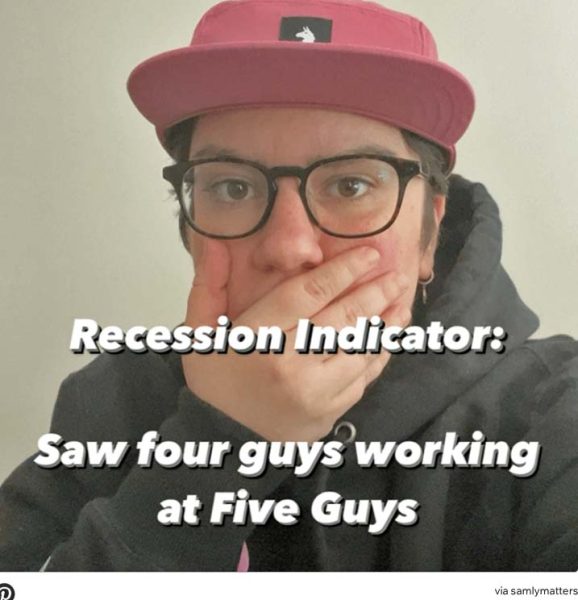
The word “recession” keeps appearing in the news these days. Will there be a recession or not? Here are some recession indicators to guide us.




One of Ted’s Facebook friends posted a closed caption speech that I think is amusing–and pointed–enough to share here.
On December 10, 2024, Canadian Member of Parliament, Elizabeth May, let Trump know exactly how she feels about him suggesting that Canada become the 51st state. She called Trump’s language about the U.S. acquiring Canada “insulting,” and went on to suggest that some of the United States’ most left-leaning states join Canada, where their policies will be more welcome. The text of PM May’s speech below is in her words; the punctuation is mine. I did not fact check her speech.
Sorry, Mr. Trump. and I really also take offense to your idea that Pierre Poilievre wasn’t good enough to lead the Conservatives. Wayne Gretzky–I mean, he’s great; he is the Great One. He skates to where the puck is going, and it’s not going to MAGA. The puck is on the Canadian ice rink, and by the way, Mr. Trump, please, before making public pronouncements that Wayne Gretzky should run for Prime Minister, give yourself–or get yourself–a briefing on the nature of parliamentary democracy. [It is] a Westminster parliamentary system and a constitutional monarchy where no one runs for Prime Minister. We have elections for members of Parliament. We don’t get to pick and choose among our billionaire friends for who gets a seat at the cabinet table if they’re not elected a member of Parliament. Our system is different from that of the United States of America. I suggest that Mr. Trump find one of his grandchildrens’ schoolbooks and look at the year 1770, which may explain a few things to him about why our system of government is different.
I don’t want to belittle Mr. Trump, but on the other hand, hey, Donald, have we got a deal for you! You think we want to be the 51st state? Nah! But maybe California would like to be the 11th province. How about it, California? Oregon? Washington? We’ve got geography and common goals, and not only that, we’ve already got a carbon trading system between California and Quebec. We’ve got some strong alliances on our West Coast from British Columbia. There’ve been a lot of academic papers on the idea of Cascadia.
So, California Governor Newson, and Washington State Jay Inslee, and newly-elected governor of Oregon Tina Kotek, how about it? Want to put a referendum to your citizens?…This is what you get: free health care–universal free health care. No more one-year-olds who suddenly fall off the Medicaid list and their parents are in the news because they’re trying to do a GoFundMe so they can get their daughter to a doctor. Universal free health care.
And guess what–those gun laws that your Congress is too afraid to pass? Because of the National Gun Law lobby, we already got our strict gun laws. That’s why we have the safest streets around the world….By the way, [according to] the most recent stats, 5.9 out of every 10,000 people is killed in a fatal gun incident [in the United States], versus 0.88 per 10,000 in Canada. That’s because we have strict gun laws. California citizens, Oregon, Washington–safest streets here. We already have good gun laws and women have a right to an abortion under our universal health care system.
But, you know, we don’t have to stop here, Donald. Think about it. You could get rid of all these states that always vote Democratic. You know what else? We’ll take Bernie Sanders off your hands. [He can be a] proud new Canadian citizen of the great province of Vermont. Vermont, New Hampshire, and Maine, we’d love to see you. Our Maritime provinces already have deep links and ties [with you].
Well, enough kidding around. But honestly, President Trump, get used to it: Canada is a sovereign nation full of guess what–proud Canadians. We’re not jingoistic. We don’t bow a lot. That’s one of the things that we kind of have in common with Jimmy Carter. We’re not a big nation for braggarts and bullies. We actually like to think we’re of service to the world. We could do better. We can always do better, but we love our country. And it’s a country. It’s a nation. And we do not aspire to be the 51st state.
Canadian MP, Elizabeth May
During an interview following her speech, MP May added, “If it was a joke, it was never funny and it ends now.” Other Canadian leaders, including Prime Minister Justin Trudeau, have also spoken out against Canada becoming the 51st state, saying, “There isn’t a snowballs’ chance in he** that Canada would become part of the United States.”
Former President Jimmy Carter (October 1, 1924-December 29, 2024) was generally unappreciated during his term as President of the United States–including by me. As time went on and Carter demonstrated his beliefs in countless humanitarian ways, I began to respect him more and more.
Until he died, when the news outlets reported the things he accomplished during his presidency, I didn’t realize what an impact Carter had quietly made on our country and on the world. In 1977, the first act of his presidency was to pardon Vietnam draft resisters; the Camp David Accords (1978) are the longest-standing peace agreements in the Middle East and are still in place today; the Salt II talks with President Brezhnev of the Soviet Union resulted in the nuclear arms reduction treaty. As President and throughout his life, he worked constantly for global human rights.
Carter was determined to put principles over politics, regardless of the political consequences of his actions. Political analysts believe this is most likely what cost him a second term as President. He wasn’t a great politician, because his goal was not to be politically correct, but to lead a life of purpose. The accolades made in his honor after his death reflect a person who achieved his goal and can only be described as an exceptionally fine human being.
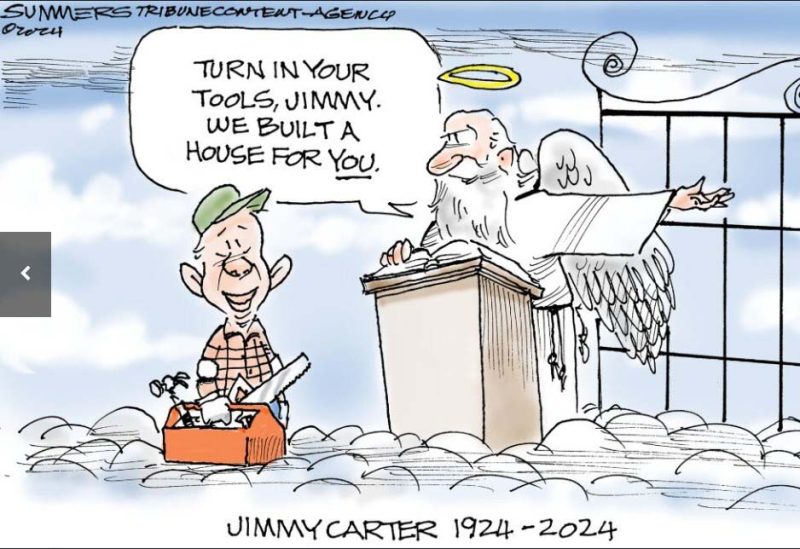
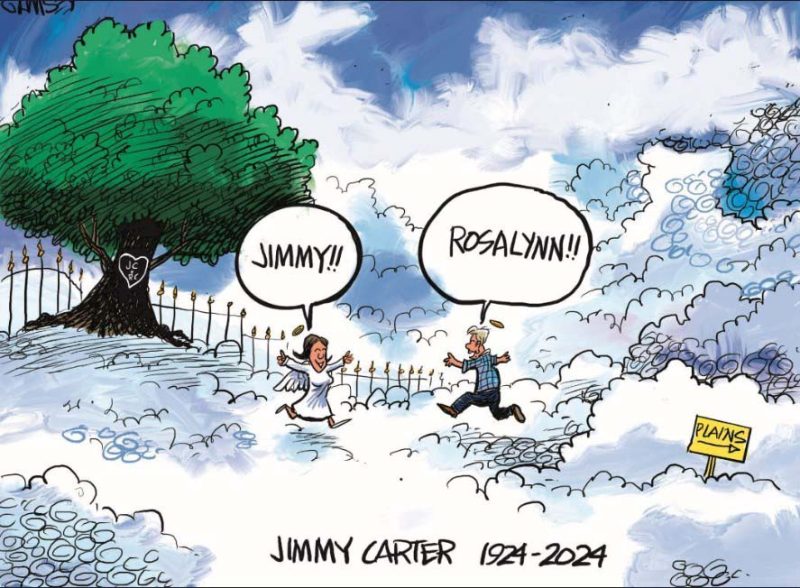
Missouri has only two weeks of early voting, and Ted and I wanted to vote early. We went on the second day and found ourselves in an unexpected traffic backup–something that has never happened to us when we’ve voted in the past. It took us at least 45 minutes to move 0.2 miles on I-70 to the exit ramp, and that was less than one-third of the distance we needed to go. Considering that when we eventually arrived at the Election Authority building, we’d have to find a parking place and then stand in line to vote, we decided to come back on another day when the crowds (hopefully) diminished a bit.
Since then, the local news reports have been filled with information about the large number of voters turning out for early voting and how backed-up the traffic and voter lines are in St. Charles County. One report informed us that St. Louis City has a smaller population than St. Charles County and has 8 early polling locations. St. Louis County has a larger population than St. Charles County and has 14 early polling locations. St. Charles County has 2–yes, 2–early polling sites, and both have traffic jams and voter lines that circle the buildings. After a few days, the news included information that more poll workers had been added to the sites, police traffic control was on-site to help with traffic, and an additional day of early voting–Monday, November 4–had been added. Even so, the traffic and voter lines on TV didn’t look any shorter than those shown in earlier reports.
When you’re a meteorologist (or married to one), lots of things are about the weather. We’ve been having absolutely gorgeous fall weather with much higher-than-normal temperatures in the upper 70s and upper 80s. A cold front was expected to bring severe storms last night with colder weather behind it–not to mention that today is Hallowe’en. (Note: the forecast “verified” in meteorological speak–we had severe thunderstorm and tornado warnings at 2:15 a.m. last night.) Ted and I figured that: (1) fewer people would want to stand in a long line surrounded by puddles in upper 50s/low 60s cloudy weather with nicer weather coming back tomorrow; and (2) lots of people wouldn’t want to be tied up at the polls late in the afternoon with trick-or-treaters expected after 5:00 p.m., so we picked today to vote. We came prepared with lawn chairs, extra jackets, water bottles, and snacks.
Sure enough, the line on I-70 was 0.1 mile shorter than last week, and we made faster forward progress. Not speedy; just faster than last week. We inched our way to the Election Authority building for 57 minutes before we parked the car, having traveled a whopping 0.75 miles in that time. On our way home, I took this picture of the traffic backup near the corner of the street that is home to the Election Authority building (left side of picture). On the right side of the photo, the line extends down the exit ramp and onto I-70. The Election Authority building is on a dead-end street, so there’s only one way to get there once you’re near that street, and the streets from the other two directions were also backed up.

We finally reached the Election Authority parking lot, and then it took another 5 minutes for a traffic guide to indicate where we should park and to inform us of the one-way route around the building to exit after voting.
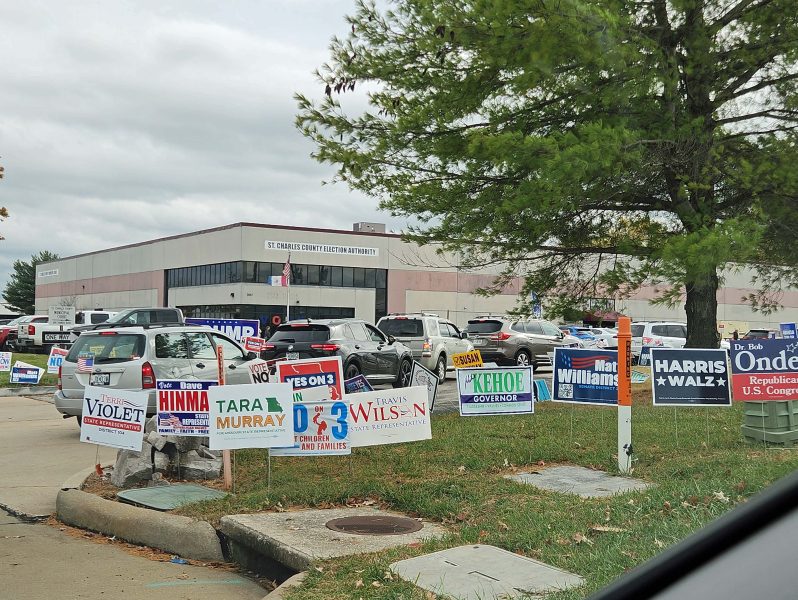
After an hour of mostly idling the car, we were surprised to see that the line of voters wasn’t that long. This is what we expected–a line that went all the way around the building. (Photo credit to online news 3 three days ago.)

This is what we got. There were only about a dozen voters behind me when I took this picture. Where are all those people from all those cars??!!

It’s probably best not to be an undecided voter when you arrive at the polling place. Every candidate and every ballot issue has a sign and none of them really contributes to a decision-making process: “Vote for me!” “No, vote for me!” “Vote YES.” “Vote NO.”
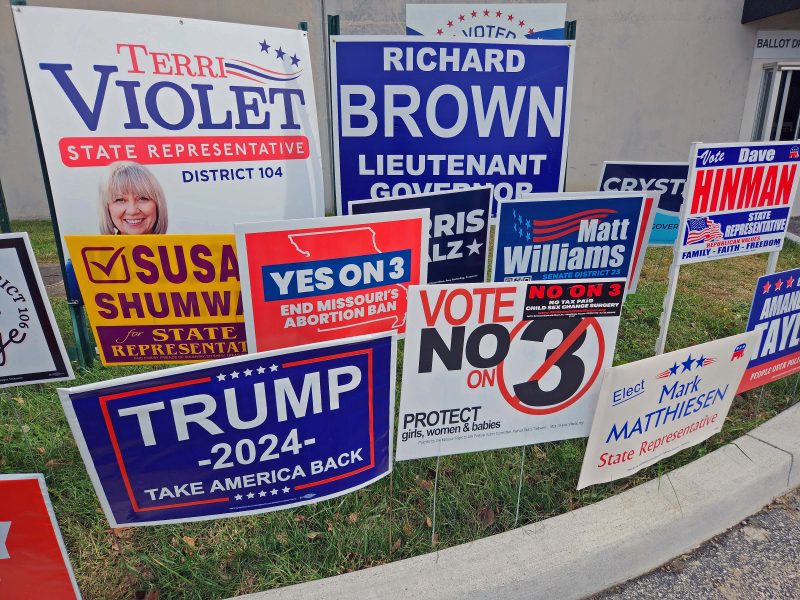
It only took about 30 minutes to go through the line, check in, pick up a ballot, and vote. There were far fewer people inside the building than when Ted and I voted here in 2020 during the pandemic, and everything went very smoothly, with no disruptions. (I think the traffic cops held up the traffic to slow access to the building. In other words, I think we idled in the car in a traffic line instead of waiting outside the building in a people line.)
Based on my observations, the election site and the ballots are secure. The curbside voting and drop-off ballot boxes were staffed, guarded, and secure. It looks like St. Charles County will have a fair election. And, of course, the people here are what TV commentators have been calling “Midwest nice.” 🙂
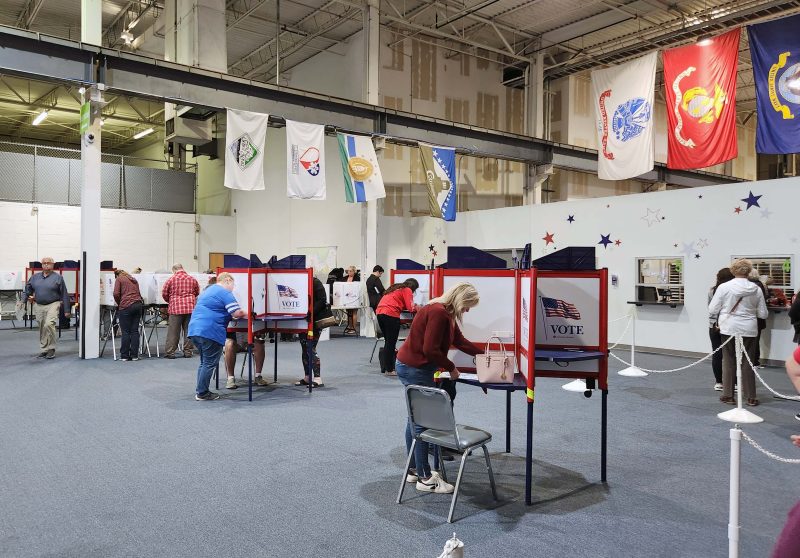
We voted and headed for home. It took us only 18 minutes to drive the same distance that required nearly a full hour in the other direction.
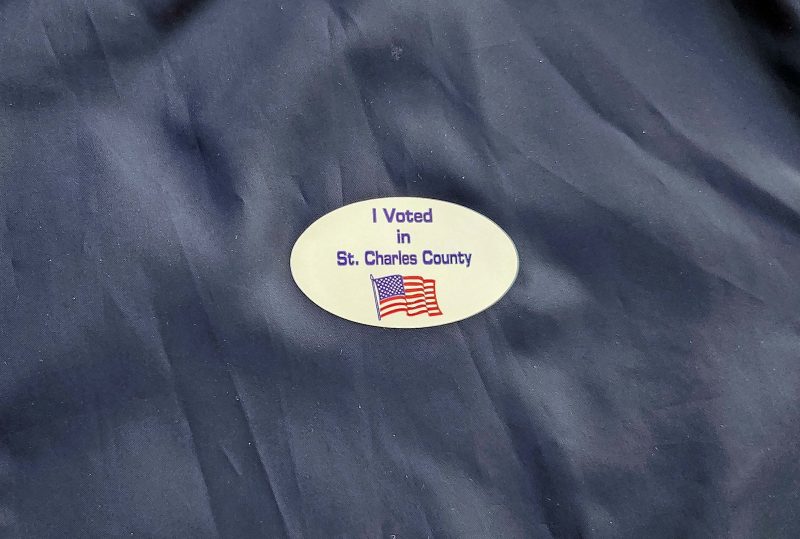
When the political ads started playing on TV this evening, I wondered why they were still playing, since I’d already voted. Then I remembered that there are still four more days to vote: Friday, Saturday, Monday, and Tuesday, November 5. Get out and vote!
P.S. We left the extra jackets, lawn chairs, and snacks in the car. Thanks to the crummy weather, traffic control, and extra poll workers, the voter line didn’t circle the building, so we reached the front of the line relatively quickly.
I didn’t know there were words to “Taps” until Ted and I were scouting out parks to view the April 8 total solar eclipse. We saw this memorial to the soldiers of Jackson, MO and it includes the words to “Taps.”

For several months, workers have been laying cables for broadband throughout our county. One day, this truck was parked on our street. It’s hard to read in the photo, but right above the orange cone, it says “We’ll be at your house in a Gigabit.”

Hallowe’en was more than a month ago, but I think this display is worth posting.
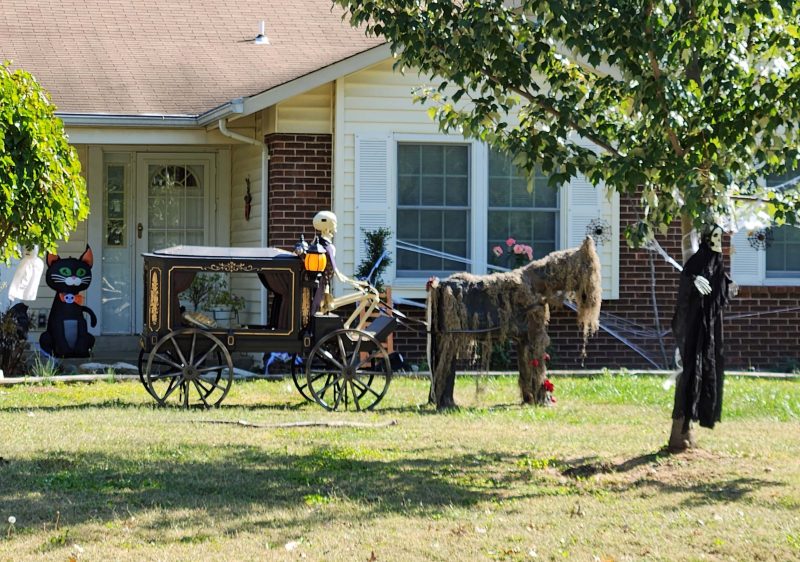
This neighborhood sign encapsulates the issue with only a few words.
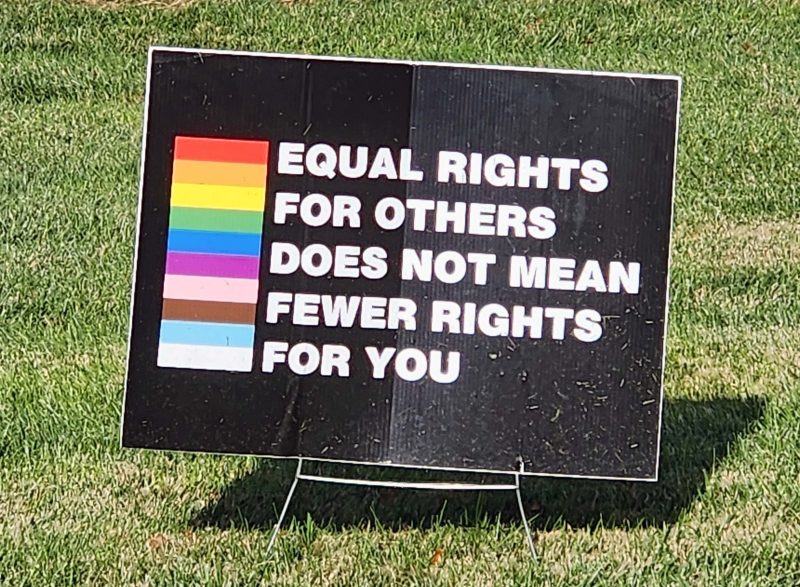

As a book lover, an avid reader, and an educator, if I started talking about these issues, I might never stop. I’ll just say two things: (1) The best way to get people to read a book is to ban it; and (2) Legislators, do your job and let teachers do theirs.

The April election is coming up next week and there is some neighborhood disagreement regarding who should be elected to our district school board. Will was the first to put up his campaign booster signs–six of them, visible upon approaching the corner from either side.

Not to be outdone, Paul’s signs appeared across the street a few days later for three different candidates–only half as many signs as Will has, but one is much bigger than any of Will’s. Paul’s signs face two directions so they can be seen from all three approaches at the 3-way stop “T” intersection.

Paul apparently feels very strongly about his candidates. The large sign is lit from both sides at night and includes the promise of “Academics NOT Agendas.” There are seven candidates running for the school board (vote for three). Neither of our neighbors is supporting Candidate #7. Does that mean s/he’s a very bad choice or a very good one?
P.S. Paul and Will are good friends, as are all of our neighbors–they just have different political points of view.
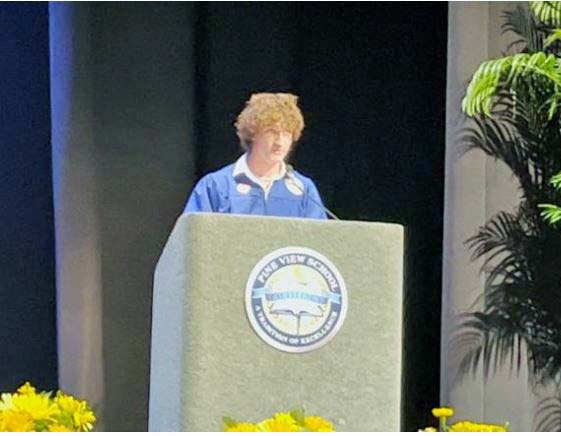
A recent CNN news article by David Williams had an interesting story with a creative twist.
Zander Moricz, the class president at a Florida high school couldn’t say “gay” in his graduation speech because of Florida’s “Don’t Say Gay” law, so he talked about something else that made him different from his classmates: his curly hair.
Zander began his graduation address by removing his mortarboard and pointing at his head. “I used to hate my curls,” he said and told the audience how he tried desperately to straighten that part of himself. He confessed that curly hair is difficult in Florida because of the humidity, so he decided to just be proud of who he was and came to school as his “authentic self.”
There weren’t any other “curly-haired people” to talk to in school, so he went to his teachers for guidance, and their support helped him. “There are going to be so many kids with curly hair” he said, “who need a (supportive) community and won’t have one. Instead, they’ll try to fix themselves so that they can exist in Florida’s humid climate.”
Zander closed by reminding his fellow students of the times they rallied against anti-Black violence and to draw attention to the climate crisis, and he told them that they have power and they need to use it. “When you waste your power,” he said in his speech, “what you’re really doing is giving it to whoever has the most already, and right now, those who have the most are coming for those who have the least.” This is good advice for all of us, whether or not we have curly hair.
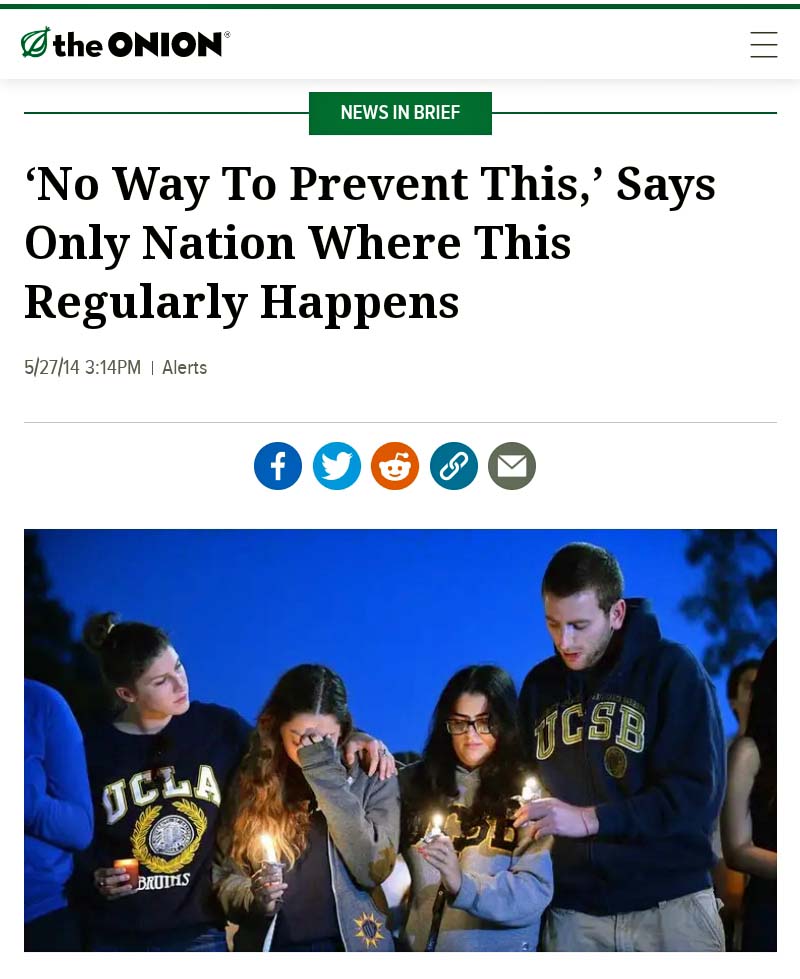
The Onion is infamous for this headline because the satirical news outlet runs it after nearly every mass shooting. It was the front page headline and story again after the Uvalde, TX school shooting on May 24. The Onion ran the story 21 times that day, referring to a different mass shooting each time. The Onion article continues by saying that, after every mass shooting, someone says, “This was a terrible tragedy, but sometimes these things just happen and there’s nothing anyone can do to stop them.” The Onion’s story always ends with the same sentence: “At press time, residents of the only economically advanced nation in the world where roughly two mass shootings have occurred every month for the past eight years were referring to themselves and their situation as ‘helpless.'”
In reaction to the Uvalde school shooting, Golden State Warriors head coach, Steve Kerr, banged on the table during an interview and shouted, “When are we going to do something? I’m so tired of getting up here and offering condolences to the devastated families that are out there. I’m sorry, excuse me, I’m sorry, I’m tired of the moments of silence. Enough!” Then he left the interview.
In his address to the nation, President Biden asked, “What in God’s name do you need an assault weapon for except to kill people? Deer aren’t running through the forests with Kevlar vests.”
Schools that experienced a mass shooting are often closed or entirely renovated to decrease the traumatic reminders they present to their communities. Until last week, I was unaware that federal legislation created a grant funding process for schools to be razed after a mass shooting. After the Uvalde shooting, Texas State Senator Roland Gutierrez asked, “What kind of world are we living in that legislation was created for razing these schools?”

In the past week, I’ve learned that the United States is number one in the world for gun ownership. Civilians in the U.S. own 120.50 guns per 100 people, nearly twice as many as the second-ranking nation, the Falkland Islands, at 62.2 guns per 100 people.
I also learned that an assault rifle can fire 45 rounds per minute; however, assault rifles can be modified with a rapid-fire trigger that allows them to fire as many as 950 rounds per minute. I, personally, have never fired a gun and I have no desire to ever do so. That said, I’m confident that I could hold an assault rifle with a 30-round magazine, aim it in the general direction of a target, and hit the target. I can’t call that a “sporting” gun. It’s meant for murder, nothing less.
The Uvalde shooter purchased 1,657 rounds of ammunition with a debit card. U.S. soldiers carry 210 rounds into combat in 7 magazines of 30 rounds each. One magazine is in the soldier’s rifle and each soldier has 6 spare magazines. After the Uvalde shooting, 60 magazines were found–58 on the Uvalde school property and 2 at the shooter’s home. At 30 rounds per magazine, that’s 1,800 rounds of ammunition–8.5 times what a combat soldier carries into battle. 315 cartridges were found inside the school (142 of them were spent cartridges) and 192 were found outside on the school property (22 were spent cartridges). Why do civilians need a weapon that was designed for the military? Why can an individual civilian buy more ammunition than soldiers take into combat?

I understand that the Constitution supports the right of individuals to bear arms. The right to bear arms, however, does not necessarily preclude a need for background checks and a waiting period prior to purchasing a gun, nor does it necessarily mean that military weaponry should be available to civilians. Why are so many gun proponents opposed to a background check? What background check discoveries do they fear? Why is a waiting period an issue of contention? In other words, what are potential gun owners in such a hurry to shoot? Where does the line fall between the second amendment right to own a gun and the right of citizens to “life, liberty, and the pursuit of happiness” without fear of becoming a victim of a mass shooting?

Within days of a rare mass shooting that killed 50 people in Christchurch, New Zealand (March 15, 2019), the country banned most semi-automatic firearms. Since then, New Zealand has had only 4 mass shootings. In comparison, the U.S. has had 214 mass shootings in the first 5 months of 2022. (New Zealand has 26.3 guns per 100 people-4.5 times fewer than the U.S.) Only a few days ago, Prime Minister Justin Trudeau of Canada said, “One Canadian killed by gun violence is one too many.” Canada has banned 1,500 types of military-style assault firearms, and a new bill Trudeau is proposing will prevent people from buying, selling, and transferring handguns within the country. The new bill also stipulates that firearms will be confiscated from those involved in domestic criminal harassment cases. I don’t think those laws are unreasonable. What sane person would want guns in the hands of violent persons? Which gun owner will have to be gun-less if s/he cannot own a military assault rifle?
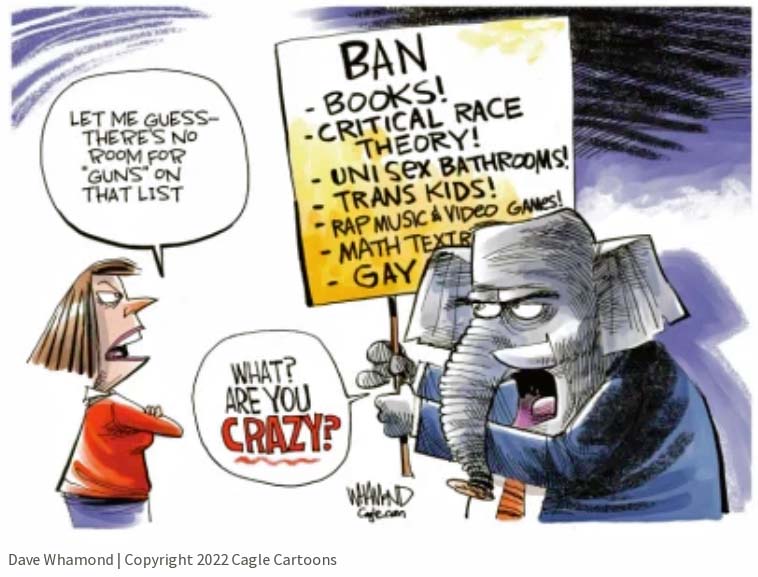
130 people were killed by guns in the United States over the past weekend. How many gun deaths will be enough to convince our legislators that gun control measures are necessary? How many more innocent school children, church-goers, concert attendees, grocery shoppers, mall walkers, movie-goers, etc., etc. need to die by gunfire before our voters and our legislators recognize the futility of thoughts and prayers and the need for gun control laws? Enough!


I just finished reading Kristin Hannah’s book The Four Winds. It’s a really good fictional account of one family’s struggle during the Dust Bowl and the Great Depression. The sections of the book are indicated by the year of the narrative and a quotation related to that year. Sadly, FDR’s statement in 1934 is true today.
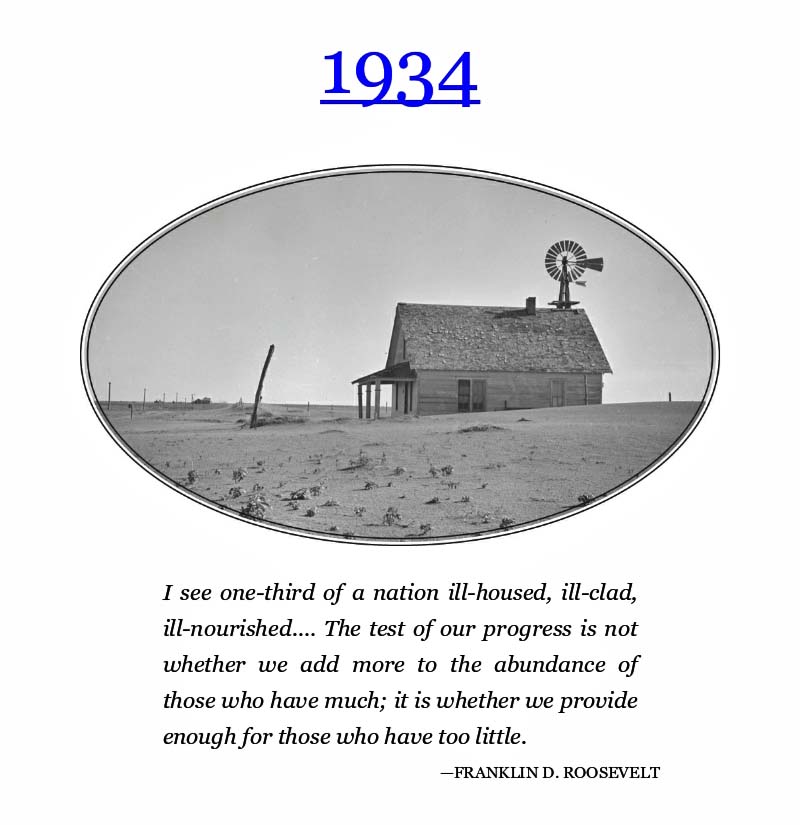
The author’s note at the end of the book states that she started writing this book in 2017 and finished it in May 2020, during the coronavirus pandemic. The Dust Bowl was the worst environmental disaster in United States history and included a collapse of the economy and massive unemployment. “Never in my wildest dreams,” Hannah writes, “did I imagine that the Great Depression would become so relevant in our modern lives. . . . In the end, it is our idealism and our courage and our commitment to one another–what we have in common–that will save us.”
One of the things voters feared in the 2020 Presidential election is Biden’s plan to raise taxes. Not everyone continued to read or listen to the details clarifying that Biden’s proposed tax hike would only affect those whose annual income exceeds $400,000. Today, while scrolling through my news feed, I found a string of social media comments about Biden’s plan.

And finally, . . .

In preparation for the installation of our future hot tub, Ted and I are scheduling contractors and making a final decision about the placement of the hot tub. One of the questions we have is, “How far from the swimming pool does the hot tub have to be to meet the local building code?” I’ve learned that’s a complicated question, and I think I might have stumped the county building department staff.
I called the county government office and spoke with Christina. She told me I need to speak with the Planning and Zoning Department and transferred me to Karen. Karen told me that our property is zoned R1E, so I need to talk with someone in the Building and Codes Department. That person told me it’s not really a building code question; it’s a safety code question. She directed me to Patty, a Plan Reviewer, in the Safety Codes Department. Patty said she’s working from home, and the person to speak with is Todd, who works in the Code Enforcement Department. Todd didn’t answer his phone, so I left a message for him.
It’s been two business days and Todd hasn’t called me back, but I think the question might have become moot. After planting flags at each end of the patio to indicate the hot tub size, we decided to put it at the other end of the patio. In that area, the hot tub will be 11-12 feet from the swimming pool–surely a safe distance from the pool to keep people from climbing on the hot tub to jump over the pool fence so they can get hurt in the process or drown in the pool and and file a claim against our liability insurance.
Update: Now picture the hot tub here instead of there. The tree is saved from becoming mulch, but the bush on the left needs to be moved.

I don’t like to get too political in this blog, but serious times call for serious thoughts.
As Ted and I were driving to our polling place to vote on Tuesday, SiriusXM observed Blackout Tuesday by halting programming for three minutes of silence. The silence was preceded by a brief statement from SiriusXM CEO, Jim Meyer, who said the programming pause included “one minute to reflect on the terrible history of racism, one minute in observance of this tragic moment in time and one minute to hope for and demand a better future.”
Following the three minutes of silence, three meaningful songs were played on Channel 6–the one we were listening to. The first song was A Change Is Gonna Come by Sam Cooke. It includes a repeating chorus with the words “It’s been a long, a long time coming / But I know a change gon’ come, oh yes, it will.” The second song was If I Can Dream by Elvis. The first verse asks “If I can dream of a better land / Where all my brothers walk hand in hand / Tell me why, oh why, oh why can’t my dream come true?” The third song was Sittin’ on the Dock of the Bay by Otis Redding. The lyrics to this song express a sense of hopelessness, especially in these words: “I’m just sittin’ on the dock of the bay / Wastin’ time / Looks like nothing’s gonna change / Everything still remains the same / I can’t do what ten people tell me to do / So I guess I’ll remain the same, yes.”
Ted and I were so moved by the silence and the music that we remained silent until the DJ came back on the air in “normal” mode. We later commented that the silence and those selected songs gave us a sense of hope, a belief in the possibility of future change, and a feeling that it’s time and it’s possible for all of us to calm down and work together for the good of all.
We contrasted SiriusXM’s message to the feelings created by the words of our President, who tweeted “when the looting starts, the shooting starts” and urged mayors and governors to call for military assistance, to use “overwhelming force,” and to “dominate” in their efforts to bring order to their cities. He warned protesters in Washington, D.C. that they would face “vicious dogs and ominous weapons.” He was immediately contradicted by Washington, D.C. mayor Muriel Bowser who replied that there were no vicious dogs or ominous weapons, and was flagged by Twitter for “glorifying violence.”
Maya Angelou felt strongly about the power of words. She said “Words have the power to bring out the best, or the worst in you. To lift you up, or tear you down. With your words, you can either empower or disempower, both yourself and those with whom you share your words. And that is why it is so important to pay close attention to the words you use.”
No one in our country has a platform equal to that of our President. While our population deals with the many stresses caused by COVID-19, by the unconscionable murder of George Floyd by police officers who promised to “protect and serve,” and by the resulting protests in over 400 U.S. cities, it is, at the very least, distressing that our President chooses words to instill anger, divisiveness, and fear, rather than to call for calm, unity, and change.
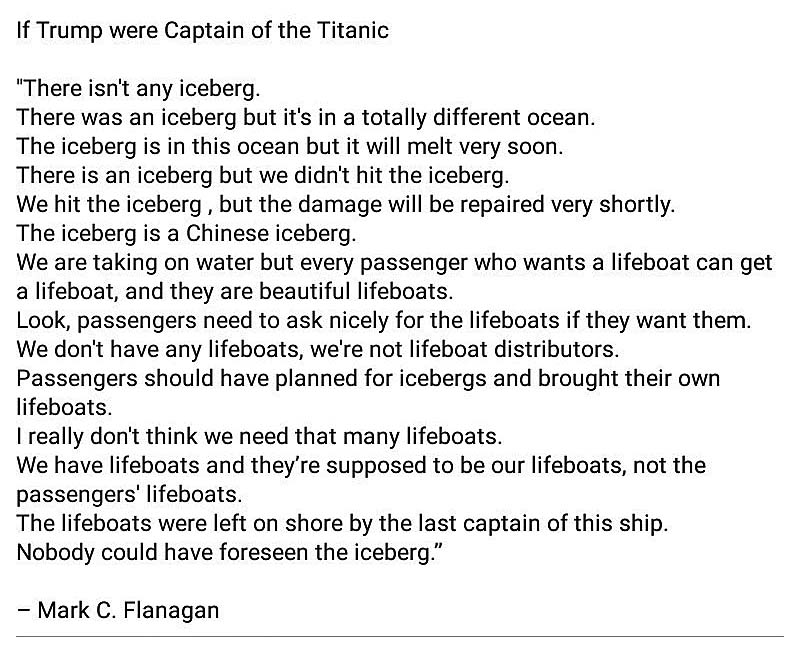
As University of Wisconsin alumni, Ted and I receive the UW magazine. We each found an especially interesting article in the current edition. My “find” is a philanthropic educational initiative. I know a number of universities have similar programs, and I’m proud that my alma mater is one of them. (FYI, Bucky Badger is the UW mascot, thus “Bucky’s Tuition Promise.”)

Ted’s favorite article is cuter and more fun.


A Michigan school district is trying something new (?) to increase the mental abilities of elementary school students. The district has created a “sensory path” in one of the hallways in the school building to give the students a “brain break” from their classroom work.

The sensory path was created by the school district’s occupational therapist and its speech-language pathologist to “help students get out of their seats and stay active during the school day.” Students can jump hopscotch boards, use their hands or feet to follow spots on the floor (aka “Twister”?), follow circles on the wall, or do wall push-ups along the sensory path. The sensory path is based on results of studies indicating that movement increases blood flow and heart rate, which increases mental ability. (That’s news?)


Back in the day when I was in elementary school and roller-skated about 300 feet uphill to school on nice days, the school day ran from about 9:00 a.m. until about 4:00 p.m. (It was a long time ago. I don’t remember the exact times.) There were about 50-60 students in the eight grades in the building, and we arrived 15-20 minutes before school started so we could play with our friends outside until the bell rang. We had a 30-minute morning recess and a 30-minute afternoon recess, during which we were required to go outdoors all year unless it was raining or extremely cold (on a scale of Wisconsin winter weather).
During our 60-minute lunch period, some kids went home for lunch (less than a 5-minute bike ride) and others ate their lunches in the classroom. We ate quickly, because we wanted to be included in the outdoor games that filled the rest of the lunch hour. The games were kid-organized, not teacher-directed, so they were what we wanted to do. By the time recess and lunch were over, we were more than ready to sit in our seats and rest while we studied. Our blood was flowing nicely, and our hearts were beating quickly enough to make us sweaty.
We didn’t have a sensory path in our school, but I’ll bet we had good brain stimulation and a lot more fun playing outside with our friends for two hours every day.
After Special Counsel Robert Mueller’s report was submitted, Steven Colbert brought his audience up to date. Here’s Steven’s list of reasons why . . . well, you can read it.
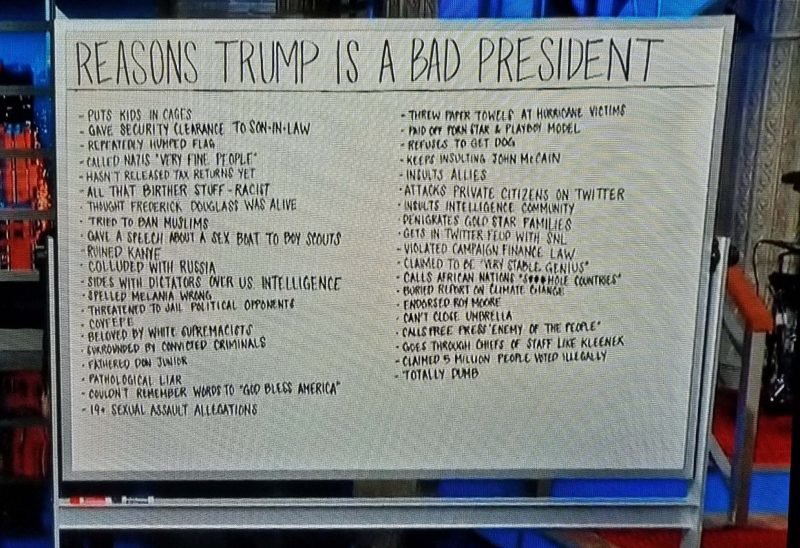
Thanks to Mueller, one reason can be erased.

On the other side of the whiteboard, Steven listed the ongoing investigations of President Trump, . . .

. . . and one of those can be erased as well. Only 16 to go.

Jonathan Haidt developed 27 non-political questions that can help identify if your brain is more Republican or Democratic. If you want to discover your brain’s political stance, go to chartsme.com. Answer the questions truthfully, and don’t read the explanation at the end of this post until you’ve finished.
It’s very cold outside, so I’ll think about spring while you take the quiz. When you’re ready, scroll down past this photo.

As you might have guessed from the nature of the questions, Haidt developed a “disgust scale.” A scientific study showed that this trait (disgust) can help determine if you are politically more conservative or more liberal. Conservatives tend to be more prone to disgust.
Some scientists think disgust might be an ancestral reaction that protected more primitive people from contamination and disease. (Think drinking water vs. pond scum.) There are probably more accurate tests if you need a test to determine your political leanings, but this one was kind of fun.
Here are my results: 39% conservative and 61% liberal. I guess I’m less affected by disgusting things than I thought.

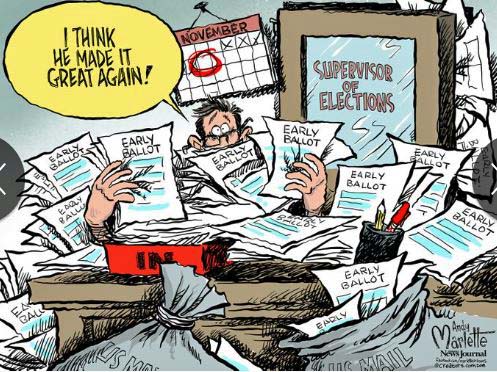
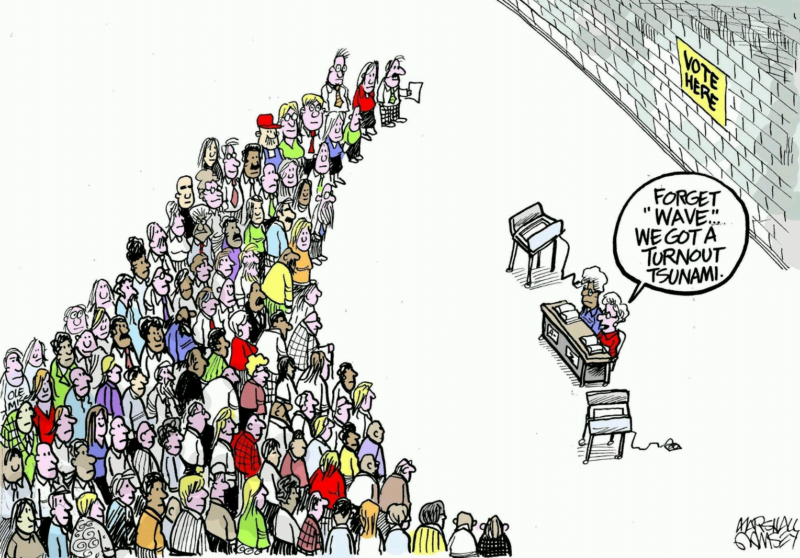
Ted’s and my polling place had longer lines than we’ve ever seen, even for Presidential elections. We usually vote between 2:00-4:00 pm, because it’s pretty dead then–no before work, lunch break, or after work voters. We walk in, sometimes wait for one person ahead of us, vote, and leave. Today, however, it took us 45 minutes to get through the line and, when we finished, the line was longer than when we went in.
Other people in line were commenting on the large turnout as well. One of the judges mentioned that the reason our polling place no longer accommodates two precincts is that the people in our precinct vote! Another woman in line suggested that we put marijuana on the ballot more often.

The line ahead of us snaked across the room three times in an “S” shape before it reached the election judges’ table. I counted over 75 people ahead of us–during the slow time.

When we arrived, we were at the door. When we left, the line extended outside the door and alongside the building, and there was a line of cars arriving and hoping to find a parking spot.
It was great to see such a huge voter turnout. Go, U.S.A.!
The graphic I posted might not be a joke after all. Canada’s national legalization of marijuana is very popular with the public. Maybe too popular, as described in a USA Today article.


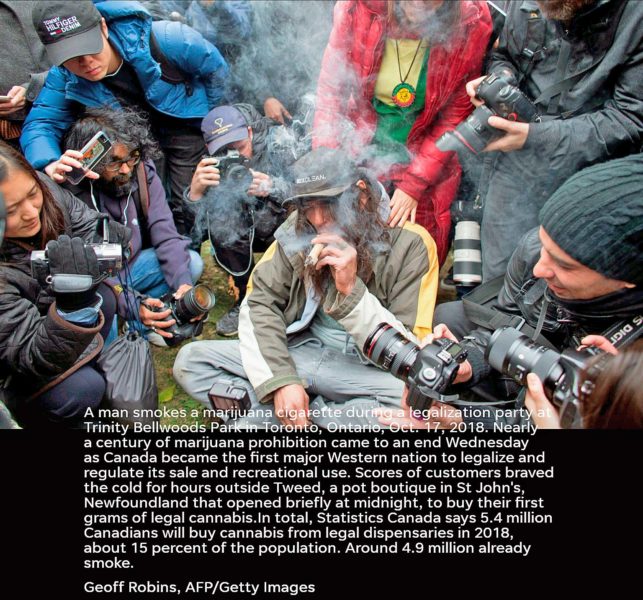

Yes, Missouri will vote on legalizing marijuana in November. Of course, the propositions are for medical use only, but Missouri is such a red state, it’s hard to believe the issue even made it to the ballot! We might have to try baking a new kind of Christmas cookies.

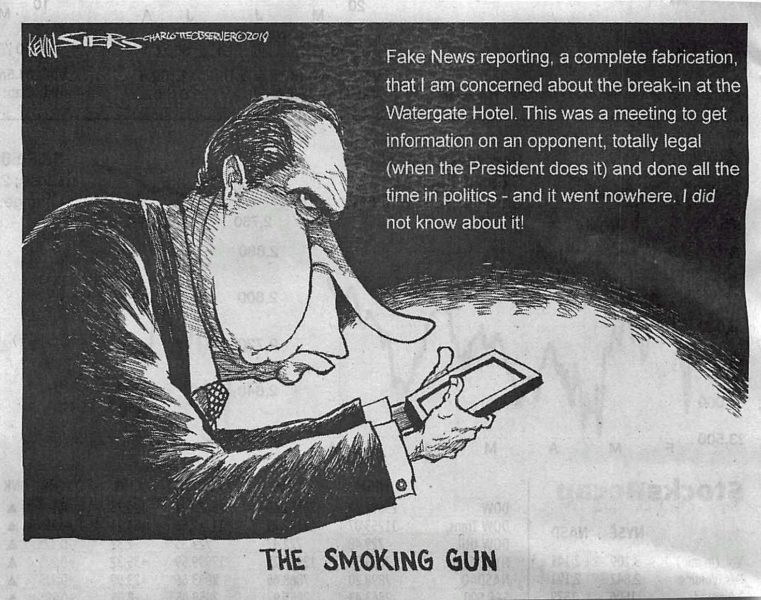
This is Emanuel Leutze’s iconic 1851 painting, “Washington Crossing the Delaware.”

Political artist Jon McNaughton, inspired by Leutze’s painting, created his own version of Leutze’s work and titled it “Crossing the Swamp” (below). McNaughton says he wants President Trump to be remembered for restoring America’s greatness. In McNaughton’s painting, the water in front of the Capitol is filled with alligators, and President Trump is lighting the way to safety for his soldiers.

Following the release of McNaughton’s painting, social media reacted with mocking parodies, including different people in the boats.


Long live the First Amendment.
As an Elvis fan, I find it hard (impossible?) to resist current movies about Elvis. Now that you know that, you also know it was a given that Ted and I would see The King.
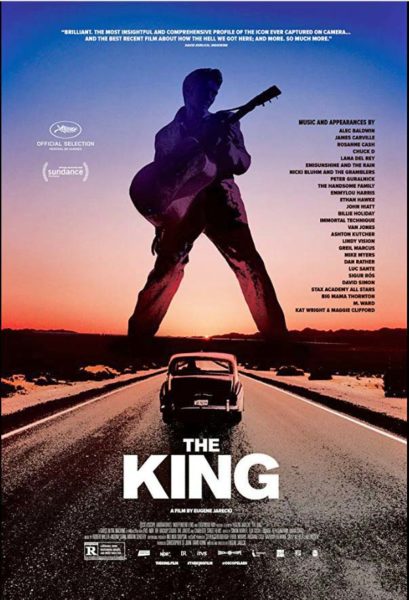

Even as an Elvis fan, I’d have to say it’s a (long) reach to use Elvis’ life as a metaphor for the changes in the United States over the past 82 years (Elvis Presley: 1935-1977). Still, there were a number of good points made in the movie. Some that I’m still thinking about are:
Point 1: The United States is the only country that includes the pursuit of happiness as an unalienable right (cf the Declaration of Independence).
Point 2: Elvis epitomized The American Dream as it used to be: a poor boy who made good. It’s almost impossible to believe in that American Dream now, with an obscenely large amount of wealth distributed among an obscenely small number of people.
Point 3: The U.S. is an empire. We cannot call ourselves anything but an empire when we count the number of countries in which we control property for our military bases. Nor can we defend policing other countries and/or waging wars in other countries in the name of spreading democracy unless we identify our country as an empire.
Point 4: Any country in which political office can be bought is not a democracy. Today’s super PACs assure that political offices are paid for by special interests to assure that our non-democracy is governed to favor those special interest groups.
My review of the movie: It was fun to see all the clips about Elvis from his birth to his death. The cameo comments about Elvis and about the United States from a variety of people were interesting and thought-provoking. Most surprising of all, I have to revise my stereotypical opinion of rappers. Chuck D of Public Enemy played a large role in the movie, commenting on the state of America. He made me want to sit down and talk with him about his opinions.
After all that serious content and a stunning performance of Unchained Melody by Elvis, recorded live just two months before he died, Ted and I needed to lighten up. So we went to see another movie.


Yes, the plot was as thin as the blurb above indicates, but it was a musical and that’s what we’d expected.
Important points made in the movie: none.
ABBA music in the movie: great.
Happiness factor at the end of the movie: high.
To cap off an enjoyable day, Ted and I went out to dinner. Aaahhh, life in retirement is good.
This was in the news today:


The U.S. State Department refused to answer a New York Times reporter’s questions, but an official statement from the Department of Health and Human Services said the resolution “placed unnecessary hurdles for mothers seeking to provide nutrition for their children.”
As Elvis said when a fan picked a piece of lint off his jacket and then wrapped it to save as a souvenir, “It never ceases to amaze me!” For a variety of reasons, some mothers choose to use baby formula rather than breastfeeding, but how is it possible for anyone to be against breast-feeding babies??!!
I agree with those economists who insist that “trickle down economics” does not strengthen the economy. (Didn’t we learn that during the Reagan presidency in the 1980s?)
“Trickle down economics” insists that by making the rich richer, those wealthy folks will take the extra money and invest it in business and manufacturing to create jobs for the middle and lower classes. Facts show that, although this is slightly true, the wealthy invest most of the extra money in their already fat portfolios. On the other hand, “trickle up economics” posits that if the middle and lower economic classes are given more disposable income, they will spend it, thus creating a need for more goods and, therefore, more jobs as well as increased profits for the big companies (i.e., the wealthy folks).
The economists with whom I agree don’t seem to make a lot of noise, but at least one cartoon artist is on our side. Yeah!
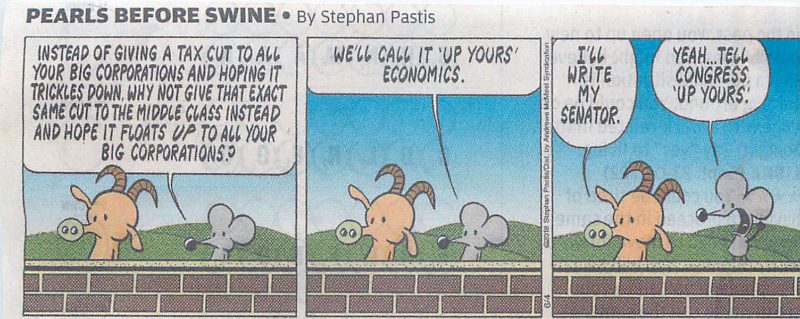


These two impersonators were quickly removed from the opening ceremony at the 2018 Winter Olympics. “Kim” made a statement to the press:
“We wanted to surprise everyone and bring world peace and then we’re being escorted out by security guards, which I think is really unfair,” the Kim impersonator said. “Doesn’t everyone want peace?”
One of my Christmas gifts from Kari was Booker T. Washington’s autobiography, Up from Slavery, first published in 1901. Kari hastily told me that she knows I’m not fond of autobiographies. (She’s right. In my opinion, it takes a lot of ego to believe that people are so interested in learning about your life that they’ll pay to read about it, and I usually find autobiographies to be very egotistical.) Kari followed up by telling me it’s a really good story and a quick read. She was right again.
Booker T. Washington was born a slave in 1856–just before the Civil War–and was a young man during the Reconstruction period. All his life, he was determined to get an education, and managed to work his way through the Hampton Institute in Hampton Virginia. The Hampton Institute was founded and headed by General Samuel Armstrong, a commissioned officer in the Union Army. Armstrong is best remembered for his work as an educator, helping the freed slaves to become educated, not only in academics, but through technical and industrial training as well. Washington adopted Armstrong’s teaching methods and philosophy in his Tuskegee Institute in Tuskegee, Mississippi. There was no greater admirer of General Armstrong than Washington, and the values Armstrong modeled are still applicable today. In his book, Washington writes:
From [Armstrong’s] example, . . . I learned the lesson that great men cultivate love, and that only little men cherish a spirit of hatred. I learned that assistance given to the weak makes the one who gives it strong; and that oppression of the unfortunate makes one weak. . . . [Armstrong] was too big to be little, too good to be mean. (Washington, pp. 96, 104)
This was a St. Louis headline today. The high-end Parkway School District in western St. Louis County has a very ethnically diverse student body. An African-American Parkway Central girl was interviewed about this incident for a TV newscast. She said nothing like this has ever happened to her before. My first thought upon hearing her statement was that our President and others in high positions have made it acceptable to speak in derogatory and divisive terms of people who disagree with them, and/or of people who are not like themselves. As a result, incidents like this seem to be increasing in number.
In my opinion, the recent well-publicized tweet exchange between Chairman Kim of North Korea and President Trump approaches cyber bullying–a crime in most states–and definitely falls into the category of body-shaming. That two world leaders would address each other in such a disrespectful (and public!) manner is shocking to me.
Regardless of one’s opinion of these two world leaders, they (and far too many other influential people) are speaking and acting in ways that no mother I’ve ever known would allow. In addition to the hate speech that is becoming daily news, it’s getting hard to keep track of the number of well-known and highly-positioned men currently accused of improper sexual conduct with children and women. When will this divisive and disrespectful behavior stop? My mother taught me that I didn’t have to like everyone I met, and that I didn’t have to make them my best friends, but I was never to treat others without the respect due to them as human beings. I thought that’s what all mothers taught their children. Apparently, this is not true.
I try to avoid becoming political in this blog, but I’m tired of sitting quietly by while hate and divisiveness are chipping away at our valuable American melting pot. Just as many state and local governments are trying to do the right thing in the absence of federal leadership and support (raising minimum wages, funding infrastructure projects, fulfilling the Paris Accord commitments, etc.), we–the people–are going to have to be the ones to say “this is wrong” and to demonstrate respect, tolerance, and inclusiveness to other individuals, regardless of race, creed, color, or gender.
This cartoon didn’t go where I thought it would.

President Trump’s proposed RAISE act (Reforming American Immigration for Strong Employment) suggests merit-based immigration guidelines. It favors those who are young (26-30 years old) with a doctorate in STEM subjects, high English proficiency, and a job offer with a high salary. Thirty points are needed for eligibility to apply for a visa. To fast-track your application, it helps greatly to have won a Nobel Prize (25 points) or a similar international award.
On August 7, Time magazine published an article about the RAISE act, including the eligibility questionnaire. If you were an immigrant, would you be allowed to apply for a visa to the United States? Would Trump?

I don’t really want to make a political statement here, but this observation should be noted.

Spotted in a shopping mall.
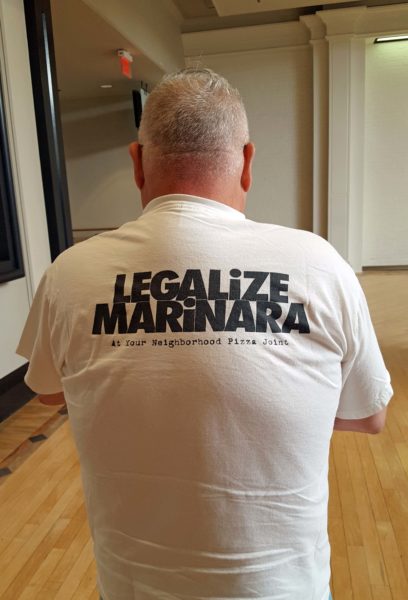
The man said he bought the shirt at a pizza place in Scottsdale, AZ.
Someone played with FaceApp, and this is making the rounds on Facebook. It’s as much fun as the Muppet Presidential look-alikes.

L -> R, top -> bottom: Mike Pence, Ben Carson, Paul Ryan, Rudy Guiliani, Jared Kushner, Reince Priebus, Mitch McConnell, Steve Bannon, Jeff Sessions